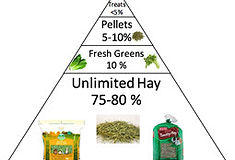
Guinea Pig Care
Guinea Pigs comes in a wide range of colors and the hair may be long, short or short and curly. Cavies have a very good sense of smell and sensitive hearing. They love to vocalize with squeals, chirps, squeaks, and whistles. Guinea pigs are not known for their intelligence, but they recognize their owners and seek them out and return affection.
Download the Care Guide
Health Care
-
Guinea pigs by nature hide symptoms and signs of illnesses making early detection of disease difficult
-
New patient exams and yearly examinations are therefore strongly recommended to help your guinea pig live a long and happy life
-
If you notice any changes to your guinea pig’s behavior, appetite or bowel movements contact us immediately
Housing
-
Avoid wire bottom cages as these can cause injuries as feet can get caught in the wire mesh
-
Try to find a cage with a removable bottom pan to make cleaning easy
Bedding:
-
Always use unscented bedding and avoid cedar and pine shavings – strongly smelling bedding can cause irritation to the nose and lungs and contribute to respiratory disease.
-
Avoid cat litter in case your guinea pig decides to eat it.
-
Avoid straw as the hard stalks can cause injuries to your guinea pig and it doesn’t absorb urine
-
CareFresh or recycled newspaper beddings (eg Yesterday’s News) are recommended as they are good absorbable unscented materials.
-
Ensure to clean the bedding regularly – spot clean daily and change all the bedding 1-2 times a week.
-
Always ensure fresh water is available
Hay
-
75-80% of the diet should be good quality hay as this helps regulate their digestive system and helps prevent dental diseases.
-
Ensure hay is always readily available.
-
Timothy hay is recommended however other alternatives include orchard grass and oat hays if your guinea pig won’t eat timothy hay.
-
Avoid alfalfa hay once your guinea pig is an adult as it has a high calcium content that can contribute to the formation of calcium stones within the urinary system
-
Always ensure your hay is fresh and free from mold.
Pellets
-
Guinea pig pellets provide a balance of vitamins, minerals and other nutrients.
-
Avoid pellets that are sold as “mixes” containing seeds, fruits or nuts – your guinea pig will pick out their favorite food and often not obtain the balanced diet they need. They can also be too high in fats leading to excessive weight gain
-
Use a timothy hay based pellet
-
Feed 2-3 tablespoons of pellets per day for an adult guinea pig.
Fresh Produce
-
Introduce vegetables slowly and one at a time to your guinea pig to prevent diarrhea
-
Avoid dark leafy green vegetables as these are high in calcium which can lead to bladder stones. This includes dandelion greens, collard greens, turnip greens, kale, spinach and parsley.
-
Fresh greens such as romaine lettuce, red/green leaf lettuce, arugula, cilantro and watercress can be offered daily
-
Offer small pieces of fruits and other vegetables such as bell peppers or carrots as occasional treats.
Vitamin C
-
Guinea pigs can’t make or store their own vitamin C so they must obtain it from their diet on a daily basis to prevent serious health problems.
-
Vitamin C is within guinea pig pellets however the vitamin C is rapidly broken down so pellets are often an ineffective source.
-
A variety of fruits and vegetables contain vitamin C which can be given in small amounts as treats to your guinea pig. Please refer to the table below for exact quantities of common fruits and vegetables:
-
Please note how low carrots are in vitamin C compared to other fruits and vegetables.
-
Often vegetables and pellets do not contain enough vitamin C alone.
-
To ensure your guinea pig is healthy consider using an oral vitamin C supplement such as one oxbow vitamin C tablet daily or liquid vitamin C (50-60mg/day).
-
Avoid vitamin C supplements that go in the water as vitamin C degrades rapidly in water.
Nutrition

-
Guinea pigs are social animals and can be kept in pairs or small groups.
-
Ensure guinea pigs are altered or of the same gender if housed together to prevent unintentional breeding.
-
Intact males housed together may fight


